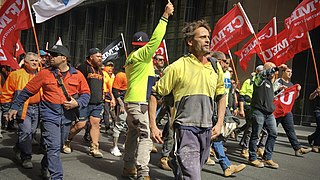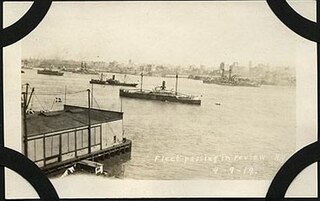
Strike action, also called labor strike, labour strike in British English, or simply strike, is a work stoppage caused by the mass refusal of employees to work. A strike usually takes place in response to employee grievances. Strikes became common during the Industrial Revolution, when mass labor became important in factories and mines. As striking became a more common practice, governments were often pushed to act. When government intervention occurred, it was rarely neutral or amicable. Early strikes were often deemed unlawful conspiracies or anti-competitive cartel action and many were subject to massive legal repression by state police, federal military power, and federal courts. Many Western nations legalized striking under certain conditions in the late 19th and early 20th centuries.
The eight-hour day movement was a social movement to regulate the length of a working day, preventing excesses and abuses of working time.

The right to sit refers to laws or policies granting workers the right to be granted suitable seating at the workplace. Jurisdictions that have enshrined "right to sit" laws or policies include Austria, Japan, Germany, Mexico, France, Spain, Argentina, the United Kingdom, Jamaica, South Africa, Eswatini, Cameroon, Tanzania, Uganda, Lesotho, Malaysia, Brazil, Israel, Ireland, Zambia, Guyana, the Indian states of Tamil Nadu and Kerala, several Canadian provinces and territories, and the British overseas territories of Gibraltar and Montserrat. Almost all states of the United States and Australia, as well as the majority of Canadian provinces, passed right to sit legislation for women workers between 1881 and 1917. US states with current right to sit legislation include California, Florida, Massachusetts, Montana, New Jersey, New York, Oregon, Pennsylvania, West Virginia, and Wisconsin. A right to sit provision is included in the International Labour Organization's Hygiene Convention, 1964; the international treaty being ratified by 52 countries as of 2023. EU-OSHA recommends suitable seating as a best practice. Local jurisdictions with right to sit laws include Portland, Oregon; St. Louis, Missouri; and London's Royal Borough of Kensington and Chelsea.

The New York City Harbor strike started on January 9, 1919. It involved 15,000–16,000 workers striking after it was called by the executive committee of the Marine Workers Union.
In 1981, a number of labour strikes, labour disputes, and other industrial actions occurred.
In 1983, a number of labour strikes, labour disputes, and other industrial actions occurred.
In 1985, a number of labour strikes, labour disputes, and other industrial actions occurred.
In 1986, a number of labour strikes, labour disputes, and other industrial actions occurred.
In 1987, a number of labour strikes, labour disputes, and other industrial actions occurred.
In 2005, a number of labour strikes, labour disputes, and other industrial actions occurred.
In 1978, a number of labour strikes, labour disputes, and other industrial actions occurred.
In 1999, a number of labour strikes, labour disputes, and other industrial actions occurred.


